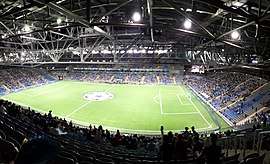Astana Arena
The Astana Arena (Kazakh: Астана Арена) is a football stadium in Nur-Sultan (formerly Astana), Kazakhstan. The stadium holds 30,000 and has a retractable roof. It serves as the national stadium for the Kazakhstan national football team. Astana Arena is the second largest stadium in the country and it was built from 2006 to 2009 at a cost of $185 million, and was officially opened on 3 July 2009. It is also a home ground for FC Astana of the Kazakhstan Premier League and FC Bayterek of the Kazakhstan First Division. The stadium hosted the opening ceremony of the 7th Asian Winter Games on 31 January 2011.[4] Astana Arena was one of the venues to bid to host UEFA Euro 2020 matches.[5]
 | |
View from the Southeast stands. | |
| Location | Qabanbay Batyr Avenue, Nur-Sultan, Kazakhstan |
|---|---|
| Coordinates | 51°6′29.4″N 71°24′9.0″E |
| Owner | City of Nur-Sultan |
| Operator | City of Nur-Sultan |
| Capacity | 30,244[1] |
| Surface | Artificial turf |
| Construction | |
| Opened | 3 July 2009 |
| Construction cost | $ 185 million[2] |
| Architect | Populous + Tabanlıoğlu Architects[3] |
| Structural engineer | Buro Happold[3] |
| Main contractors | Sembol Construction[3] |
| Tenants | |
FC Bayterek Kazakhstan national football team 2011 Asian Winter Games | |
| Website | |
| www.astanaarena.kz | |
History

Construction of the Astana Arena began in 2006. The stadium was designed by leading sports architects Populous in association with Tabanlioglu Architects.[3] The general contractor was Sembol Construction. It was opened with the Lokomotiv Astana match against the Kazakhstan national under-21 football team on July 3, 2009. Match judged famous Italian referee Pierluigi Collina, the symbolic first blow at the ball under his whistle struck the President of Kazakhstan Nursultan Nazarbayev. As part of each team, in addition to their regular players, were invited on two "stars": in the youth national team of Kazakhstan – the Georgian defender Kakha Kaladze and Ukrainian striker Andriy Shevchenko, and in the Lokomotiv Astana – Turkish players Hasan Şaş and Hakan Şükür.
On January 31, 2011, Astana Arena hosted the opening ceremony of the 7th Asian Winter Games.[6]
Characteristics
The 30,000-seat stadium was conceived as a large amphitheater with a distinctive and instantly recognizable form when viewed from a distance and from close proximity. Essentially a two·tiered structure, the lower terrace, accommodating 16,000 seats, encircles the playing area while the upper stand on the east and west sides seats a further 14,000 spectators. There is effective separation of VIPs, spectators and players to ensure smooth access. All spectators are seated and have a clear sight line with an unobstructed view of the field of play. The playing surface is covered in high quality grass surface specified to meet FIFA and UEFA criteria. The grass can be covered for other events.
Design
The stadium, designed on an elliptic form, is constructed on a 232,485 m² (330m x 704.5m) rectangular site. The design introduces innovative solutions adopting high technology principles for operational management, interaction with the environment and especially with harsh climatic conditions of the geography.
References
- "Official website". Archived from the original on 2015-07-20. Retrieved 2015-12-08.
- "Sembol's $185m Astana stadium opens". kazworld.info. 27 July 2009. Retrieved 1 July 2014.
- "Astana Arena – Kazakhstan Stadium Building". e-architect.co.uk. March 6, 2014. Retrieved March 15, 2014.
- Jena Isle (January 31, 2011). "The 7th Asian Winter Games 2011 Opening Ceremony in Astana, Kazakhstan". BatangasToday.com. Retrieved March 15, 2014.
- "Astana bidding to host UEFA matches in 2020". TengriNews.kz. September 21, 2013. Retrieved March 15, 2014.
- "Astana's new stadium ready to host games". Hurriyet.com.tr. July 7, 2009. Retrieved July 28, 2009.